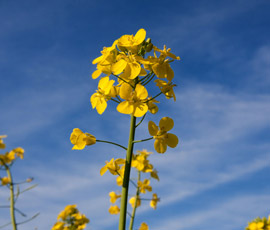UK oilseed crop remains at threat from EU plans

Up to one-third of the UK oilseed rape remains at threat if the latest EU biofuels proposals come to fruition, the NFU has warned.
In recent weeks the food v fuel debate has heated up with both sides – energy and environment – coming forward with their proposals.
Spanish MEP Alejo Vidal-Quadras has called on MEPs to reject plans for a 5% cap on the contribution of first generation biofuels – those from sugar, cereals and rapeseed – to the EU’s target of producing 10% renewable transport fuel by 2020.
Meanwhile, French MEP Corinne Lepage – the lead reporter for the EU environment committee – has called for mandatory reporting of indirect land use change (ILUC) factors on biofuels production from 2021 onwards and a tightened up cap of 4.27% for biodiesel produced from oil crops (5% was originally proposed in October 2012).
ILUC is a mechanism that attempts to deal with greenhouse gas emissions in biofuel feedstock production. It aims to tackle emissions caused through shifting the cultivation of land into new areas.
NFU combinable crops adviser James Mills said the proposals would hit the UK oilseed rape crop hard; 40% is exported to the EU for biodiesel production.
In addition, there was a worry that wheat for ethanol, planted in a rotation after oilseed rape, would no longer meet the greenhouse gas obligations if oilseed rape was taken out of the rotation, he added.
NFU combinable crops board member Brett Askew said Ms Lepage had “naively focused” on one international land use modelling result, which included basic errors that biased results against biodiesel.
“The consequences of this for arable production could be devastating, and a further blow to UK and EU agriculture,” he said.
“With an estimated reduction of one third in the cropped area of EU and UK oilseed rape and the impact of losing an important rotational crop on UK wheat yields.”
The NFU would lobby MEPs on the issue, which will be debated by the EU environment committee in May and voted on by the EU parliament on 10 July, said Mr Mills.

